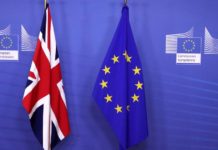Xi Jinping signals intent to remain in power by revealing politburo with no successor
Tom Phillips
China’s president unveils his all-male cabinet, but crucially no member is young enough to take the reins from Xi at the end of his second term.
Xi Jinping has kicked off his second term as leader of the world’s second largest economy, vowing to spearhead the “great rejuvenation of the Chinese nation” and signalling his intent to tower over Chinese politics for decades to come.
At just before noon on Wednesday, Xi unveiled the new line-up of China’s top ruling council – the Communist party’s politburo standing committee – leading six besuited comrades out into a blaze of camera flashes in the Great Hall of the People.
“Here, on behalf of the newly elected central leadership, I wish to express our heartfelt thanks to all other members of the party for the trust they have placed in us. We will work diligently to meet our duty, fulfil our mission and be worthy of their trust,” Xi said in a 21-minute address that marks the formal start of his second term.
Crucially, the all-male group contained no potential successor, since none of its five new members – all aged between 60 and 67 – is young enough to take the reins from Xi after the end of his second term, in 2022, and to then rule for the customary decade.
China’s Communist party enshrines Xi Jinping ideology in constitution – video
Such is the secrecy that cloaks Chinese politics that the identities of the standing committee’s incoming members were known only as Xi escorted them out onto a scarlet-carpeted stage.
Joining Xi and premier Li Keqiang on the elite committee are: Li Zhanshu, 67, Han Zheng, 63, Zhao Leji, 60, Wang Yang, 62 and Wang Huning, 62.
“I still can’t get over the fact how the world’s second largest economy, which is declaring this new role of global leadership, is nearly as opaque as the North Korean political system,” said Jude Blanchette, an expert in Chinese politics from New York’s Conference Board research group.
“I just find that absolutely striking and in a way almost unacceptable for a system that wants to play such a fundamental role in guiding and shaping the 21st century.”
China’s propaganda apparatus has touted this week’s political show as an example of openness and transparency.
However, a number of major western news organisations whose coverage of Xi’s rule has irked Beijing were excluded from Wednesday’s event without explanation including the BBC, the Financial Times, the Economist, the New York Times and the Guardian.
In his address, Xi outlined his vision for what he called China’s “new era”, an era in which an emboldened and purified Communist party would play an even more prominent role in returning the country to its former glories.
“It is my conviction that the great rejuvenation of the Chinese nation will become a reality,” he said, urging his party to become “the backbone of our nation.”
“We should never entertain the idea of taking a breather or halting our steps. Instead, we must continue to rid ourselves of any virus that erodes the party’s fabric, make great efforts to foster a healthy political environment of integrity and generate waves of positive energy throughout our party which can build into a mighty nationwide force driving China’s development and progress.”
Xi also pledged “a resolute push” to eradicate poverty, to “open China still wider to the world” and hinted at the more assertive and muscular role Beijing is expected to seek on the world stage in the years ahead.
“With confidence and pride the Chinese people will be steadfast in upholding our country’s sovereignty, security and development interests,” he said.
The unveiling of China’s new ruling council came one day after the end of the 19th party congress, a week-long political summit at which Xi established himself as the country’s most dominant leader since its revolutionary founder Mao Zedong.
On Tuesday, Xi’s eponymous political philosophy was enshrined in the party’s constitution alongside those of Mao and Deng Xiaoping, the architect of China’s economic opening to the world. Experts say that momentous and highly symbolic achievement puts Xi in a virtually unassailable position at the pinnacle of the 89 million member organisation. Having failed to anoint a successor, he is now likely to be calling the shots in Chinese politics well into the 2030s.
With Xi now entering his second, although perhaps no longer final five-year term, thoughts are turning to what the next stage of the Xi era might hold.
Supporters claim that having used a ferocious anti-corruption campaign to purge rivals and consolidate his grip over the party during his first five-year term, Xi will now turn his mind to comprehensive reforms of China’s economy.
“I think the real reform just began,” said Wang Wen, a pro-establishment scholar from a thinktank linked to Renmin University.
Wang argued that Xi would enter his second term with “much more authority” and a greater ability to implement his blueprint for China.
Such optimism was echoed in China’s party-run media on Wednesday as cadres lined up to heap praise on their all-powerful leader. “We firmly believe that if people all over the country roll up their sleeves under the guidance of Xi’s Thought … we will move steadily into the future with the irresistible force of a high-speed train,” Chen Meifang, a Shanghai railway official, was quoted as telling the Beijing Daily.
However, such hopefulness is widely disputed.
Blanchette said he expected to see a “super-sized version” of Xi’s first-term policies in his second stint, as China’s leader pursued what he saw as his “program of Chinese greatness”.
That would mean accelerating efforts to build a modern, battle-ready military that could begin to push the United States further and further out of what China saw as its Pacific backyard; an increasingly assertive foreign policy in regions such as the South and East China seas; and continued efforts to promote a hi-tech economic revolution by championing huge companies that were either controlled or heavily aligned with the state.
It would also mean that the Communist party – and the Communist party only – would continue to lay down the law, in all aspects of Chinese society.
In an editorial celebrating the start of Xi’s “new era” on Wednesday, the People’s Daily, the party’s mouthpiece, argued: “History has shown and will continue to show that without the leadership of the Chinese Communist party, the idea of national rejuvenation is a fantasy.”
“We should hunker in for a long winter of tight political control,” Blanchette predicted.
“We should hunker in for a long winter of tight political control” Jude Blanchette










